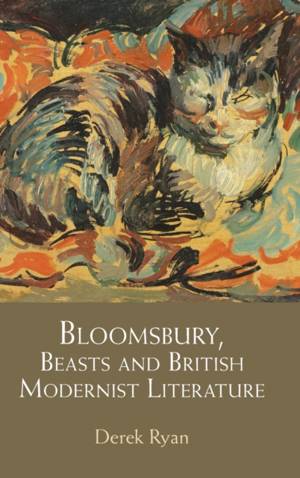
Bedankt voor het vertrouwen het afgelopen jaar! Om jou te bedanken bieden we GRATIS verzending (in België) aan op alles gedurende de hele maand januari.
- Afhalen na 1 uur in een winkel met voorraad
- In januari gratis thuislevering in België
- Ruim aanbod met 7 miljoen producten
Bedankt voor het vertrouwen het afgelopen jaar! Om jou te bedanken bieden we GRATIS verzending (in België) aan op alles gedurende de hele maand januari.
- Afhalen na 1 uur in een winkel met voorraad
- In januari gratis thuislevering in België
- Ruim aanbod met 7 miljoen producten
Zoeken
€ 152,95
+ 305 punten
Omschrijving
Bloomsbury, Beasts and British Modernist Literature reveals how the Bloomsbury group's fascination with beasts - from pests to pets, tiny insects to big game - became an integral part of their critique of modernity and conceptualisation of more-than-human worlds. Through a series of close readings, it argues that for Leonard Woolf, David Garnett, Virginia Woolf and E. M. Forster, profound shifts in interspecies relations were intimately connected to questions of imperialism, race, gender, sexuality and technology. Whether in their hunting narratives, zoo fictions, canine biographies or (un)entomological aesthetics, these writers repeatedly test the boundaries between, and imagine transformations of the human and nonhuman by insisting that we attend to the material contexts in which they meet. In demonstrating this, the book enriches our understanding of British modernism while intervening in debates on the cultural significance of animality from the turn of the twentieth century to the Second World War.
Specificaties
Betrokkenen
- Auteur(s):
- Uitgeverij:
Inhoud
- Aantal bladzijden:
- 258
- Taal:
- Engels
Eigenschappen
- Productcode (EAN):
- 9781009182973
- Verschijningsdatum:
- 15/12/2022
- Uitvoering:
- Hardcover
- Formaat:
- Genaaid
- Afmetingen:
- 152 mm x 229 mm
- Gewicht:
- 548 g

Alleen bij Standaard Boekhandel
+ 305 punten op je klantenkaart van Standaard Boekhandel
Beoordelingen
We publiceren alleen reviews die voldoen aan de voorwaarden voor reviews. Bekijk onze voorwaarden voor reviews.









